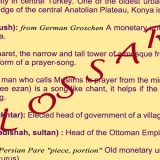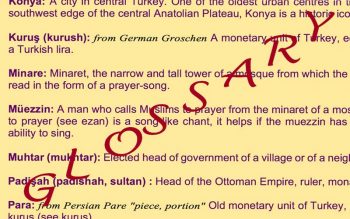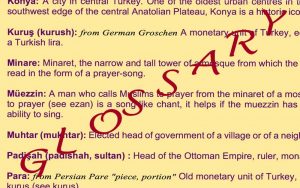Akçe: Old monetary unit of Turkey, a small silver coin valued at one third of a para (see para).
Akşehir: Nasreddin Hodja is believed to have lived in Akşehir (township of Konya, central Anatolia) which hosts his mausoleum today.
Allah: The Arabic word for God.
Baklava (baklawa): A rich Turkish, Greek and Middle Eastern dessert made with very thin pastry leaves and nuts. A simple flour-and-water dough is stretched into thin sheets, cut and layered into a large oven tray. Each sheet is liberally brushed with melted butter, and in between the layers walnuts, pistachios or other crushed nuts are laid. After the golden-brown baking, the pastry is soaked in a heavy syrup of sugar, honey and lemon juice. Mmmm, delicious!
Bursa: One of the biggest cities of Turkey, located in the northwest, near the sea and along the northern foothills of Uludağ. It became the capital of the Ottoman Empire in 1326. Bursa is surrounded by orchards watered by plentiful mountain streams. It is home to some of the outstanding examples of Ottoman architecture.
Efendi (effendi): Turkish efendi A title of respect or courtesy in Turkey; a man of high education or social standing in an eastern Mediterranean or Arab country. Even though “efendi” has a similar, almost identical meaning to “hodja”, Nasreddin Hodja is generally addressed as Hodja Efendi by his peers, superiors and fellow villagers.
Esfahan (Isfahan): Major city of the Seljuq Turks (11th-12th century) and of the Safavid dynasty of Iran (16th-18th century), now a major city in west central Iran. It lies on the Zayandeh River, south of Tehran.
Ezan: Invitation to the prayer (or the reminder of the prayer time) that is read in the form of a prayer-song from minarets of all mosques, five times a day.
Hadith (hadis): A collection of traditions containing sayings of the prophet Muhammad which, with accounts of his daily practice, constitute the major source of guidance for Muslims apart from the Koran.
Hamam (hammam, hummaum) : An oriental public bathing establishment, Turkish bath.
Helva (halvah, halva, halavah): A desert made of sesame seeds and sugar. In Hodja’s stories a simpler variation is prepared by flour, butter and sugar. This latter kind is a common food for people with limited means. It tastes great, has nutritional value and easy to make at home.
Hoca (hodja, khoja, khojah): A devout Muslim man who is respected for his knowledge of Islam and who may perform a specific duty within an Islamic community; teacher.
Imam: Prayer leader; a respected Islamic theological sage.
Kadı (qadı, kadhi): Local judge, in charge of minor disputes.
Kavuk: Turban, a Muslim man’s headdress, consisting of a long length of cotton or silk sash wound around the head or around a small cap.
Konya: A city in central Turkey. One of the oldest urban centres in the world, located on the southwest edge of the central Anatolian Plateau, Konya is a historic icon of modern Turkey.
Kuruş (kurush): from German Groschen A monetary unit of Turkey, equal to one hundredth of a Turkish lira.
Minare: Minaret, the narrow and tall tower of a mosque from which the invitation to the prayer is read in the form of a prayer-song.
Müezzin: A man who calls Muslims to prayer from the minaret of a mosque. Since the invitation to prayer (see ezan) is a song-like chant, it helps if the muezzin has a good voice and some ability to sing.
Muhtar (mukhtar): Elected head of government of a village or of a neighbourhood within a town.
Padişah (padishah, sultan) : Head of the Ottoman Empire, ruler, monarch, sovereign.
Para: from Persian Pare “piece, portion” Old monetary unit of Turkey, equal to one fortieth of a kuruş (see kuruş).
Pita (pitta, pitta bread, pide): Flat hollow unleavened bread which can be split open to hold a filling.
Saz: A long-necked stringed instrument of the lute family, originating in the Ottoman Empire.
Tavla: from Italian Tavola Backgammon, a board game in which two players move their pieces around twenty-four triangular points according to the throw of dice, the winner being the first to remove all their pieces from the board. It is among the most ancient of all games, having been played in its present form by the Romans. Tavla has been very popular with the Turks, so much as to be considered the national game.
Timur (Timour, Timur Lenk, Timurlenk “Timur the Lame”) : Timur (1336 – 1405) was the son and successor of Cengiz Han (Djenghiz, Genghis Khan), Mongolian warrior-ruler, one of the most famous conquerors of history. Timur came to the throne of Khorassan (a vast territory now lying in Northeastern Iran, Southern Turkmenistan and Northern Afghanistan) and started his conquests towards Persia, Armenia, Russia, Mesopotamia and India. He entered the Ottoman territory when he captured Sivas. Later he was the cause of the temporary disruption of The Ottoman Empire by winning a battle at Ankara (Angora) and capturing Bayezid, the Ottoman Sultan. Timur lived more than 100 years after Nasreddin Hodja’s death. It is not clear how he became part of Hodja stories. Timur, somehow entered the Hodja tales sometime in the 17th century. He represents all authority figures and is the symbol of oppression.










